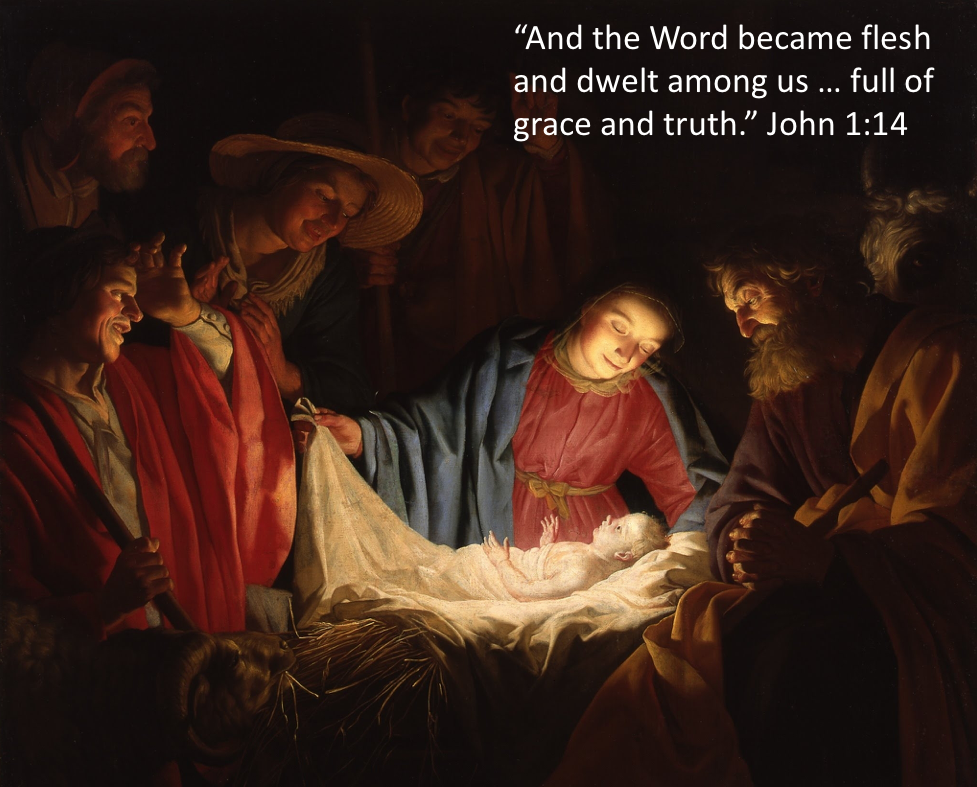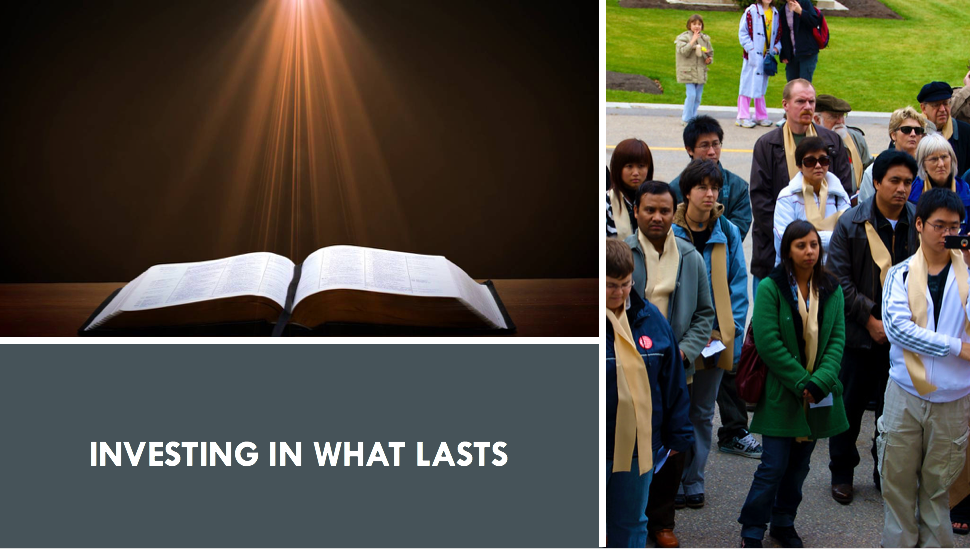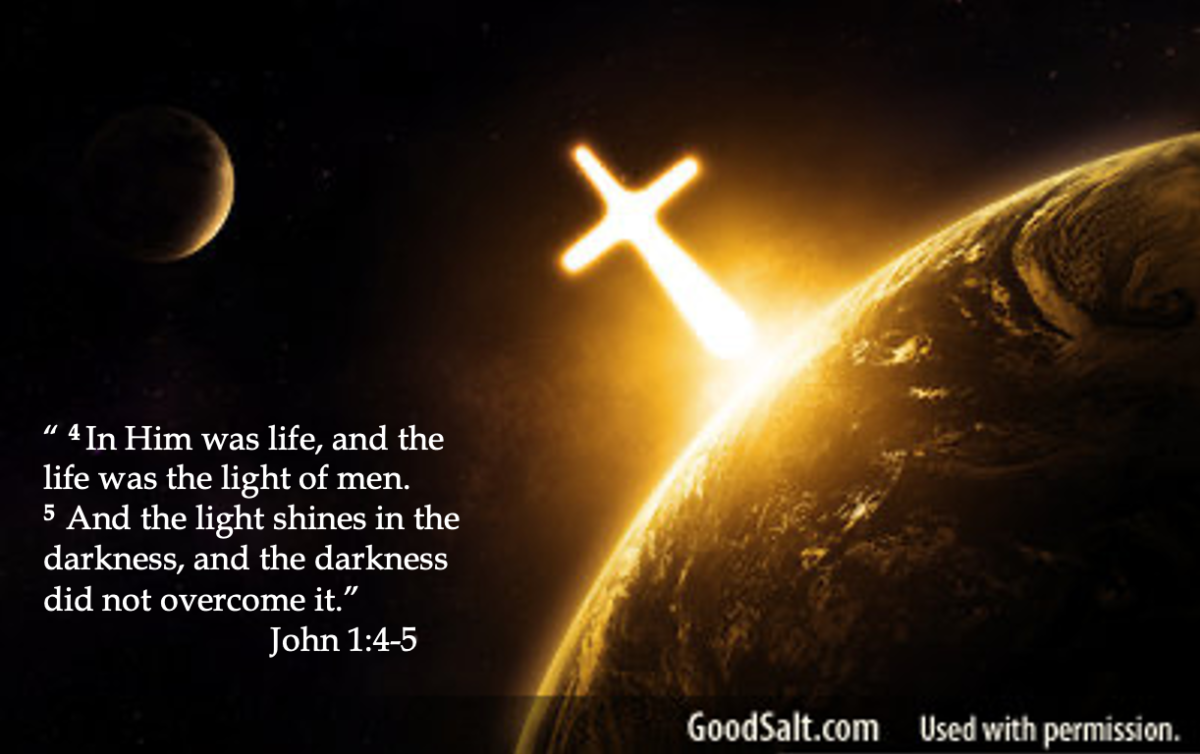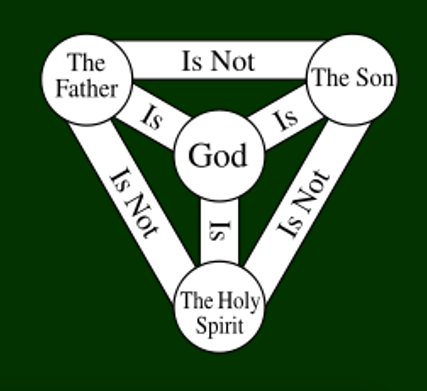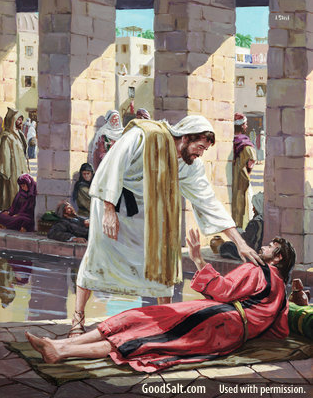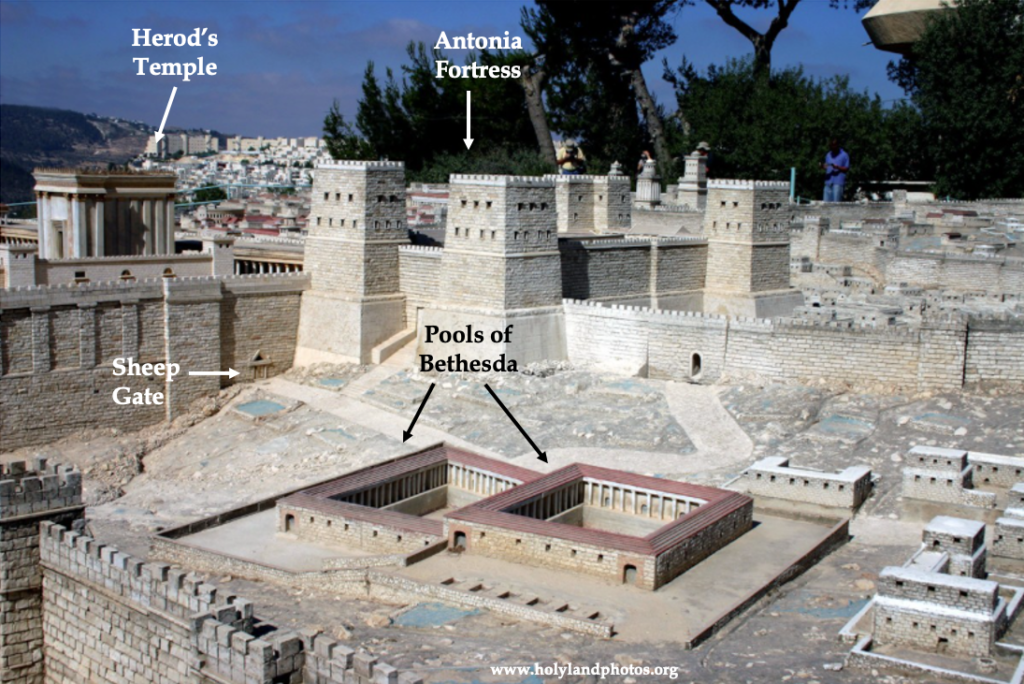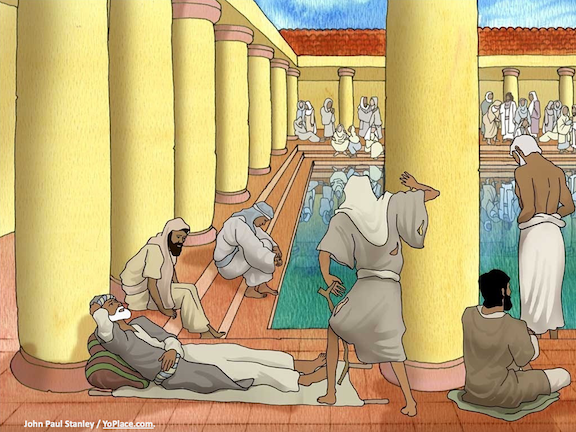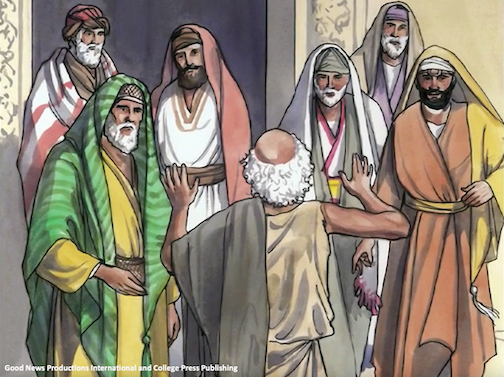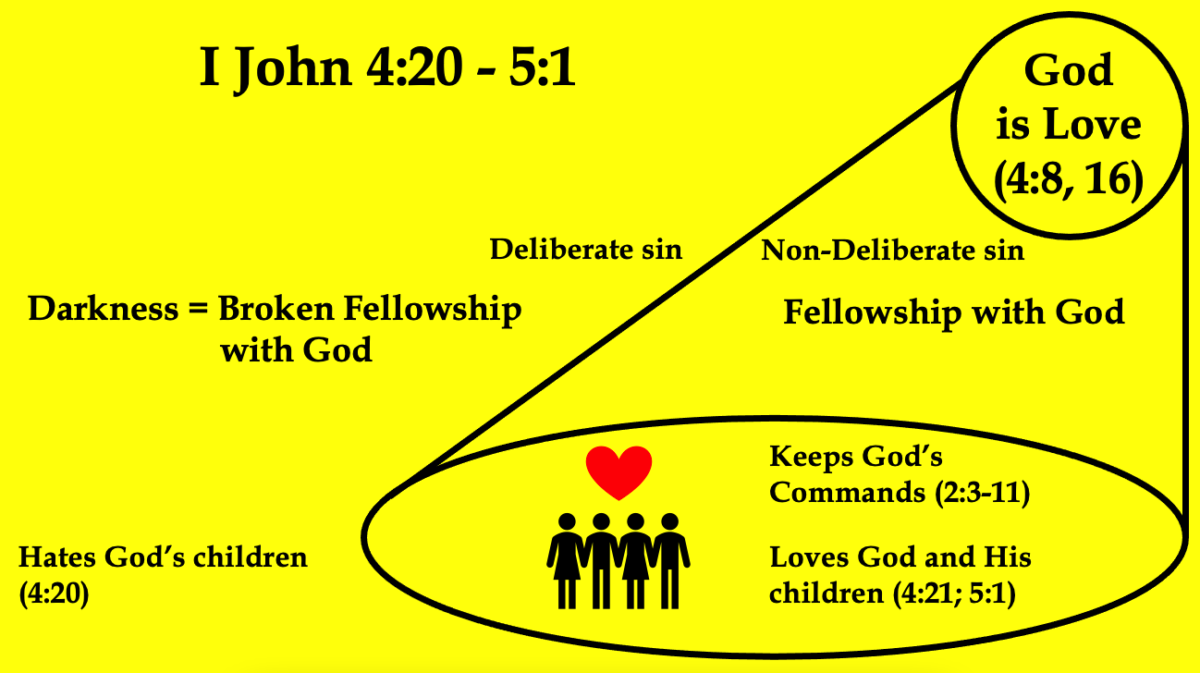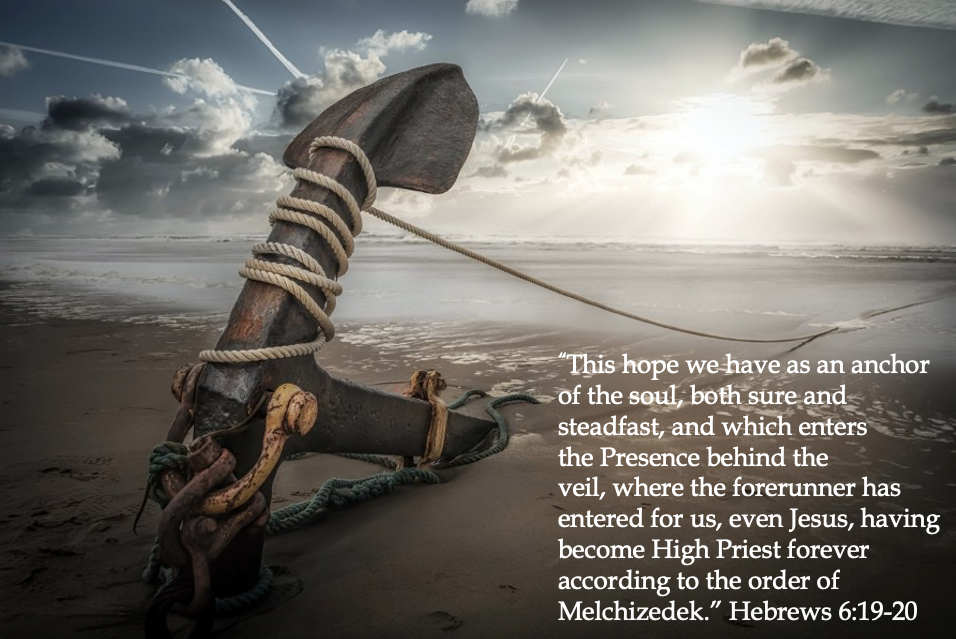“This beginning of signs Jesus did in Cana of Galilee, and manifested His glory; and His disciples believed in Him.” John 2:11
In every marriage ceremony, there is always at least one mistake. For example, a young couple, very much in love, were getting married. Sue, the wife to be, was very nervous about the big occasion and so the pastor chose one verse that he felt would be a great encouragement to them. The verse was 1 John 4:18 which says: “There is no fear in love, but perfect love casts out fear.”
Rather unwisely, however, the pastor asked the best man to read it aloud and to say that the pastor had felt that this was a very apt verse for Sue and that he would be preaching on it later in the service. The best man was not a regular churchgoer. Hence, he did not know the difference between the gospel of John and the first letter of John. As instructed, he introduced his reading by saying that the pastor felt this was a very apt verse for Sue. Instead of reading 1 John 4:18, he read John 4:18, which says, “You have five husbands and the one that you now have is not your husband.”
There is no such thing as a perfect wedding. There are always going to be problems – some of them small and some of them large. In John 2:1-11, we come to look in on a wedding that had a big problem. They were quickly running out of wine. And once they ran out of wine, the celebration would be over. The joy would be gone, and they would be running on empty.
I would imagine that there are some of you reading this who are running on empty. You thought that you had enough resources to carry you to the end of your journey, but your reserves have just about been depleted. Your joy is just about gone. It’s going to take a miracle to renew the supply of joy in your life. Jesus wants to work a miracle in your life. He wants to restore your joy so that you will have more than enough to make it the rest of the way.
Let’s look at the first of Jesus’ many miracles in John 2:1-11. It took place at a wedding. And this miracle is a picture of Christ’s transforming grace. As we look at this miracle, we will discover how we can experience the transforming grace of Jesus Christ and His overflowing joy. The first four principles apply to Christians, the last one applies to non-Christians.
REALIZE THAT THERE IS A PROBLEM (2:1-3a). 2:1: “On the third day” after Philip and Nathanael met Jesus [1] (John 1:43), “there was a wedding in Cana of Galilee.”
“John’s specific reference to days in chapter 1 and here is unusual for him. On the first day, John the Baptist gave his veiled witness to Jesus (1:19-28). The second day he gave his open witness to Jesus (1:29-34). The third day John’s two disciples followed Jesus (1:35-42). The fourth day Philip and Nathanael met Jesus (1:43-51). On the third day after that, the seventh day, Jesus did His miracle at Cana.” [2]
The exact location of “Cana of Galilee” is difficult to determine today.Some say it was located at Kefr Kenna about three and half to four miles north of Nazareth, [1] and others believe it was at Khirbet Kana (“ruin of Cana”), a site about nine miles north of Nazareth (see map below).

Regardless of what location one thinks is correct, the fact that it was near Nazareth, the region of Jesus’ upbringing (Matt. 2:22-23; 21:11; Mark 6:1-4; Luke 2:39-40, 51-52; 4:16; et al.) means it was quite likely the wedding of a close family member or friend which would explain why “the mother of Jesus was there” in a proactive role at the wedding feast. [5]
The name “Cana” [6] means “the place of needs.” [7] There would be some special needs at this wedding feast that would require Jesus’ personal attention.
A “wedding” in Jesus’ day was different than they are today in the West. “Marriages in the ancient Near East were arranged by the parents, a contract was prepared, vows were spoken in the synagogue, tokens were exchanged, and then the man and woman returned to their respective homes. Although legally considered married, they lived apart during a betrothal period, which lasted no less than two months and could be as long as a year.
“At the end of the waiting period, the groom would take to the streets with his friends, usually at night, in a torch-lit procession from his home to the bride’s, in a grand parade accompanied by pomp and color and singing. After speeches of goodwill and blessings pronounced over the couple, the groom took his bride home, where family and friends feasted for as long as a week. The groom’s family was expected to provide enough food and drink for everyone.” [8]
Instead of getting married and going off by themselves, the newly married couple were surrounded by their friends and family for the first week of their married life. How would you like to have your mother-in-law watching your every move after getting married? During that week, they had a huge celebration. The parents of the groom were responsible for providing all the food and drink that would be needed for the celebration.
2:2: “Both Jesus and His disciples were invited to the wedding” celebration. The disciples with Jesus probably included Philip, Peter, Nathanael, and the apostle John (1:35-51), and possibly others. [9] One reason why Jesus may have been invited to this wedding is because Nathanael was from “Cana of Galilee” (John 21:2), and he recently came to faith in Jesus (John 1:49). [10] The fact that Jesus received an invitation to a wedding and accepted it shows that He was not a recluse. He participated in the normal affairs of human life – including celebrations. [11]
Jesus liked to go to parties and hang out with sinners so He could draw them to Himself by giving them the love and acceptance they longed for (cf. Matt. 9:10-11; 11:19; Mark 2:15-17; Luke 5:27-32; 7:36-50; 15:1-2; et al.). The religious community marginalized these broken sinners, but Christ treated them with dignity because they were like precious pearls in His sight (cf. Matt. 13:45-46). Jesus sought the unsaved so He could save them from their sins and give them eternal life (Luke 19:1-10). Christ had a reputation as a “friend of …sinners” (Matt. 11:19). For Christians to be more like Jesus, we must go where lost sinners gather (Matt. 4:19; Mark 16:15; I John 2:6). This does not mean we participate in the sinful behaviors of lost people – God forbids drunkenness (Ephes. 5:18) – but we can still go and point people to the Savior.
2:3: John informs us that “they ran out of wine” at this wedding feast. Jews did not get drunk at these celebrations—drunkenness was considered a disgrace.
“Though the Old Testament condemns drunkenness (e.g., Deut. 21:20-21; Prov. 20:1; 23:19-21; 31:4-5), wine is often spoken of in terms of celebration, blessing, and joy (e.g., Ps. 4:7; 104:15; Prov. 3:9-10; Songs 1:2; Isa. 25:6; 55:1).” [12]
But at this wedding feast, they were running short of wine. To the Jewish people, wine symbolized joy. Running out of wine at a wedding banquet in the first century was so serious that lawsuits could be brought against you by the offended guests.
“The loss would not only have brought shame and social disgrace, however, but also financial embarrassment, since grooms had a legal responsibility in that culture to provide a suitable feast for their guests.” [13]
“Our bridegroom stood to lose financially—say, up to about half the value of the presents Jesus and his party ought to have brought.” [14]
The presence of wine stated that this was a special day and that all the guests were special guests.
“To fail to provide adequately for the guests would involve social disgrace. In the closely knit communities of Jesus’ day, such an error would never be forgotten and would haunt the newly married couple all their lives.” [15]
I can imagine that the bride was getting anxious about this time! I can hear her saying to her mother, “My wedding day is not supposed to be like this! I’m supposed to be filled with joy. But instead, I’m worried about what everyone is going to say or do when they discover that we have run out of wine.”
Maybe you have had similar thoughts. “My marriage is not supposed to be the mess that it is. Parenting isn’t supposed to be filled with so much stress. Christianity is not supposed to be like this. I’m supposed to be overflowing with joy – or so I’ve heard – but nothing seems to be going right. My joy is gone.” You may not know where your joy went. You just woke up one morning, and the supply had been completely drained. Some things have come along that you didn’t anticipate that have stolen your joy. Maybe some people have come into your life, and by their attitudes or actions, they have depleted your joy. Perhaps you have overbooked your schedule and lost your joy as a result. Sometimes we can lose our joy because of sinful choices we have made.
Mary may very well have been the one responsible for planning and coordinating this wedding feast. It would have been embarrassing for her to admit that she had messed up and not planned on enough wine. Embarrassing or not, she was willing to admit that there was a need. She said to Jesus, “They have no wine” (2:3b).
That is what we must do too. We are to admit that there is a need – that we are running out of joy. When you come to church on Sunday mornings, you may feel like everyone is expecting you to have a smile on your face and act like the world is a friendly place, and that all is okay in your life. When someone asks how you are doing, the expected response is “Fine.” But that may not be the case. And you have got to be willing to admit that to God. And you’ve also got to be willing to admit that the reason you are missing that joy in your life may be because of poor choices on your part or circumstances beyond your control. Your joy may be lacking because of the decisions of others. Whatever the case, it may be embarrassing or out of control, but your joy cannot be restored until you deal with the leak that is draining it dry. Once you admit that there is a problem, then you can do something about it.
RELEASE THE PROBLEM TO JESUS (2:3b-4). That is what Mary did. 2:3b: When she realized that there was a problem, she took the problem to Jesus. She said to Him, “They have no wine.” She didn’t try to solve it in her own strength as we often try to do. The fact that Mary came to Jesus indicates she believed He could resolve the problem. After all, He was a caring Person Who would do whatever He could to solve the problem. Being a compassionate Person, He would try to help the groom, who was responsible for the food and drink (2:9) to avoid unnecessary embarrassment and legal consequences. [16]
This tells us that Jesus is concerned with the everyday things in life that we face. This family may not have exhibited a lot of wisdom in how they planned for the wedding celebration, but the wisest thing that they could have ever done was to invite Jesus. The very presence of Jesus at this wedding opened the possibility to a miracle.
And you know something? Jesus is also here with us today. The Bible tells us that “Christ died for our sins … was buried, and that He rose again the third day… and that He was seen.” (I Cor. 15:3-5). Jesus is alive today and His power is available to everyone who believes in Him (Ephes. 1:19-21). With Jesus’ presence in our lives, there is enough power to resolve whatever problem we may be facing and build a life that is filled with joy.
When Mary came to Jesus and communicated the problem to Him, His response toward her may seem cold and harsh to us in the twenty-first century. 2:4: When Jesus said to Mary, “Woman, what does your concern have to do with Me?” He literally says, “What to Me and to you, woman?” [17] This may seem disrespectful to our modern ears to address one’s mother as “woman,” but this was an acceptable term in that day (cf. John 19:26; 20:15). It did not have negative connotations. [18] In the culture of first-century Galilee, it was very polite, much like addressing a woman as “Ma’am.” [19]
When Jesus said this to His mother, He was telling here, “Dear woman, your maternal authority does not extend into the realm of My Messianic work.” Unlike the Catholic view of Mary, Jesus did not submit to her maternal authority, nor did He worship her. Nor should Christians. [20]
These words of Jesus constituted a Semitic idiom that is difficult for Westerners to translate (cf. Judg. 11:12; 2 Sam. 16:10; Matt. 8:29; Mark 1:24; 5:7; Luke 4:34; 8:28). [21] What do we have in common? meaning: Your concern and Mine are not the same; [22] or Madam, that concerns you, not Me; [23] or Woman, what does your concern have to do with Me? [24] captures the spirit of the question. Jesus was saying in effect: We are not on the same page. He was not dishonoring His mother. He was explaining to her that He would handle the situation, but in His heavenly Father’s time and way. Jesus’ obedience to His heavenly Father was more important than His obedience to His earthly mother [25] (cf. Matt. 12:48-50; Mark 3:33-35; Luke 8:19-21).
In addition, Jesus told Mary, “My hour has not yet come.” [26] Literally these words read, “Not yet is come the hour of Mine.” Christ says His “hour” [27] or “time” [28] has not yet come (2:4; 7:6, 8, 30; 8:20) or has come (12:23, 27; 13:1; 16:21, 32; 17:1) several times in John’s gospel.
“Jesus’ ‘hour’ refers to the cross (cf. 12:27-28; 13:1, 31-32; 17:1; 19:27), His focus throughout His ministry. Jesus does not say that His hour would come prematurely if He does this miracle. Rather, in light of the fact that He actually performs the miracle, He must be indicating that He will do only those things the Father has given Him to do, and only at the proper time (cf. 4:34).” [29]
When Jesus’ “hour” finally did come, He met the need of the entire human race by dying on the cross (19:17-30). Mary was requesting that He meet a need immediately (2:3). Perhaps Jesus referred to His hour not yet having arrived to help Mary realize that the meeting of needs was something He needed to control. Just as it was not yet time for Him to die, so it was not yet time for Him to meet this pressing need for wine. [30]
There may be times when we bring our requests to God for what we think would bring joy into our lives – but God’s response seems cold and harsh. It seems like the windows of heaven are closed. But the response that Jesus gave to Mary was to let her know that she was no longer in control. He was no longer under obligation to do what she wanted when she wanted it. He was now obligated to fully obey His heavenly Father, not His earthly mother.
When it comes to asking God to do certain things in our lives, God is under no obligation to do things our way or in our time. He commands us; we do not command Him. God knows better than we ever could what will bring us the most joy and when is the most beneficial time for Him to answer our requests. God does miracles and He answers prayers, but He does it in His time and in His way.
There is one prayer that Jesus will always answer with a “yes” as soon as that prayer is offered up to Him. That is the prayer for forgiveness. After King David had sinned against God, he prayed to Him, “Have mercy upon me, O God, according to Your lovingkindness; according to the multitude of Your tender mercies, blot out my transgressions. Wash me thoroughly from my iniquity and cleanse me from my sin.” (Psalm 51:1-2). Notice that David did not ask God to forgive him according to David’s goodness or righteousness, but according to God’s “lovingkindness” and “the multitude of” His “tender mercies.” That is called grace – receiving what we do not deserve.
As believers in Jesus, we still sin after we are receive eternal life as a gift (I John 1:8, 10; 5:13), but all God asks us to do when we do sin is “confess our sins” to Him “and He is faithful and just to forgive us our sins and to cleanse us from all unrighteousness.” (I John 1:9).Confessing our sins restores our fellowship or closeness with God after we have sinned against Him.
If your joy is gone, or if you have never found joy because you are living a life that is contrary to what God says, then come to Jesus as you are. He will work the miracle of forgiveness.He will fill you with His joy.
RESPOND TO JESUS WITH TOTAL OBEDIENCE(2:5-7). Inviting Jesus to the party made it possible for the supply of joy to be renewed and refreshed. But the simple fact that Jesus was there did not bring the joy. It did not replenish the wine. To have your joy restored, you must be willing to do whatever Jesus tells you to do.
After Jesus gave His mother a mild rebuke (2:4), Mary did not resist or nag Him. Instead, she instructed the servants to cooperate with whatever Jesus told them to do. 2:5: Mary says to the servants, “Whatever He says to you, do it.”At that moment, Jesus ceased to be a guest and became the One Who was in control of the whole wedding celebration.
Mary “did not understand what He would do or when, but she had confidence in His compassion and ability. She demonstrated admirable submission and faith toward Jesus. She allowed Jesus to take charge and solve the problem, and she pointed others to Jesus, not to herself. Previously she had approached Jesus as His mother and had received a mild rebuke. Now she approached Him as her Lord and shortly received satisfaction (cf. Matt. 15:21-28). In this she provides an excellent example for Christians.” [31]
And at that moment, a miracle began to happen. It is easy for us to be willing to have Jesus as a guest in our lives, but are we willing to turn over the controls and “do whatever Jesus tells” us to do? Only then will we see Christ do miracles in our lives.
I greatly admire Mary because she is the mother of the Messiah. For those of us who respect her, it is important to listen to what she told the servants, “Whatever He says to you, do it” (2:5). What does Jesus say to do to have everlasting life? He says, “whoever believes in Him should not perish but have everlasting life” (John 3:16). Christ does NOT say, “whoever… accepts Him/ is baptized with water/ confesses Him/ follows Him/ gives his life to Him/ invites Him into his heart/ keeps His commandments / obeys Him/ prays the sinner’s prayer/ repents/ submits to His Lordship/ surrenders to Him/ turns from his sins or is sorry for his sins, etc.”
Jesus simply says, “Whoever believes in Him.” To “believe in” [32] Christ means to be persuaded that He is speaking the truth and is therefore worthy of your trust. [33] Do you believe Jesus was speaking the truth when He said, “whoever believes in Him should not perish but have everlasting life”? And He is therefore worthy of your trust to do just that? If so, you now have everlasting life as a free gift, and Christ guarantees you will never “perish” in hell, but “have everlasting life” both now and forever. Jesus comes to live inside of you through His Holy Spirit (cf. John 1:12; 7:37-39) so that His joy and love can fill your life to the brim (Rom. 5:5; Gal. 5:22)!
Since the Lord Jesus used the word “believe” more than any other words to express what a sinner must do to receive everlasting life (John 3:15-16; 5:24; 6:35, 40, 47; 11:25-26, et al.), Christians submit to His Lordship when we use the word “believe” when we evangelize the lost. It is not submitting to His Lordship when we refuse to use the word Jesus used most in evangelism and substitute it with words that are more popular with others. Our sinful nature does not like someone else to tell us what to do and how to do it. So, when Jesus instructs us to use the words “believe” or “faith” with His own example (and the example of other Christ followers in the New Testament) when inviting a non-Christian to respond to the gospel, and we use other words or phrases that confuse instead of clarifying the only condition for obtaining eternal life, we are saying to Him, “I know better than You, Lord. I will use some other phrase or condition that everyone else is using.” We are refusing to submit to God when we neglect to use the words He uses most (“believe” and “faith”) in evangelism (see comments on 1:7b) and replace them with words that are either used far less in the New Testament for evangelism or they are not mentioned at all in God’s Word. When it comes to evangelism, Christians are called to submit to the Lordship of Jesus Christ by using the words God uses most in evangelism – “believe” and “faith.”
Failure to submit to Christ’s Lordship in this way is extremely costly for the unsaved person who hears Christians use unclear cliches and substitutes in place of the words “believe” and “faith.” It is costly because these non-Christians are more likely to miss the only condition for receiving the gift of eternal life – believe in Christ alone for eternal life.
Can you imagine standing before the Lord Jesus at the Judgment Seat (cf. Rom. 14:10-12; 2 Cor. 5:10) and being asked by the Lord why we refused to use the words He used most in evangelism? This will be a very painful experience for the Christian who refused to submit to Christ’s Lordship in evangelism (cf. I Cor. 3:15; Gal. 1:6-9).
2:6: John informs us that there were “six waterpots of stone.” “Stone pots did not absorb moisture and uncleanness like earthenware vessels did, so they were better containers for water used in ceremonial washings.” [34]
“The Jews” would use the water in these stone waterpots for ceremonial “purification.” They would come to the pots and let water run over their hands. It wasn’t a matter of sanitation but of ceremony. It did nothing to clean them physically or spiritually. It was simply an outward show.
“The Jews washed before eating in order to cleanse themselves from the defilement of contact with Gentiles and other ritually defiling things, more than from germs. They needed much water since they washed often (cf. Matt. 15:1-2; Mark 7:3-4).” [35]
An outward show, then or now, has never been able to produce joy. Simply coming to church and going through the motions will not produce joy in your life. They will put you in the place where you can find joy and put you around the people who will help to enhance your joy. But if you hear God’s Word without doing His Word, you will become even more miserable than you were to begin with (cf. Matt. 7:24-27; James 1:22-21). If we say the prayers but refuse to listen to God’s Spirit as He speaks to us, then our prayers will only produce emotional and spiritual conflict in us. If we read the Bible with no intention of obeying it, then we will only provoke guilt within ourselves.
The fact that there were only “six waterpots of stone” suggests that there was something lacking. “In Scripture six is often an incomplete number. That there were not seven pots suggests that something was lacking. The stone waterpots were used for ceremonial Jewish washings: according to the manner of purification of the Jews. This may represent the legalistic works-salvation thinking of pharisaic Judaism (cf. 4:28; 5:39-47). If so, this miracle has meaning on two levels: It gives evidence that Jesus is the Messiah, and it shows the error of pharisaic Judaism’s soteriology.
“The waterpots show that Judaism without the Lamb of God was incomplete. No permanent purification could be given apart from the coming of Jesus’ hour (cf. Heb 10:1-19).” [36]
2:7: The word “them” refers to the servants to whom Mary had previously spoken (2:5). When they heard Jesus speak, they responded in obedience. They began the process of filling the stone waterpots with water. Each of these stone pots held between “twenty or thirty gallons” of water “apiece” (2:6). That’s up to one hundred eighty gallons of water!
“This would provide more than 150 gallons (580 liters) of wine. That’s enough for 2400 one-cup servings.” [37]
It would have taken a lot of time and energy to accomplish this task. Trip after trip to the well to draw water and pour it into the pots. And we don’t know how far it was to the well. It would have been tempting to do a half-hearted job. After all, Jesus only said to “fill” the jars with water. He didn’t say how far to fill them. And “fill” is a word that can be interpreted in many ways depending on how hot it is and how late in the workday it is. Anything over halfway is full, isn’t it? That’s what potato chip companies seem to think. But these men didn’t think so. When Jesus told them to fill the jars, they took Jesus’ words quite literally, and they filled them all the way “to the brim,” just shy of overflowing. This was more than enough to meet the need that this newly married couple had encountered. [38]
Christ’s command to “fill the waterpots with water” and when the servants did, “they filled them up to the brim” (2:7), “suggests something about the overflowing nature of the wine Jesus provided at the wedding, and of the life it represents. Jesus gives life to the brim to those who believe in Him. And this life is not merely unending life in the kingdom of God. It is a life that is brimming with potential (cf. 10:10).”
Do you want God’s joy in your life? To receive that joy, you might even be willing to be obedient to God – to a certain extent, right? But are you willing for your obedience to reach all the way to the brim even when the obedience that Jesus asks for doesn’t make sense to you? Or when it requires more work than you had originally intended on giving? Or when it forces you to rearrange your priorities and your schedule like these servants had to do? You see, the amount of joy that you experience is in direct proportion to the amount of obedience that you give. The greater your obedience, the greater your supply of joy will be. Jesus said, “10 If you keep My commandments, you will abide in My love… 11 These things I have spoken to you, that My joy may remain in you, and that your joy may be full” (John 15:10-11). When Jesus tells you to do something, never do it halfway because Jesus wants to give you joy to the full.
I don’t know where the brim is for you, but I know that to get there, you must do whatever Christ tells you to do even when it doesn’t make sense. Even when it is inconvenient or painful. It will require hard work. It won’t be easy. You must ask yourself; “How badly do I want the joy that God has to offer?”
RECOGNIZE THAT IF IT MATTERS TO YOU, IT MATTERS TO JESUS (2:8-10). 2:8: The servants took the water that had been drawnout from the stone pots and presented it to “the master of the feast” [39] or headwaiter/chief steward. [40]
“The architriklinos [headwaiter] was originally the superintendent of the dining-room who arranged the couches and tasted the food, not the toastmaster [sumposiarches].” [41]
As far as we know, Jesus had not told the servants about the miracle that He was going to perform. To them, they were carrying a cup full of water not wine. But when the master of the feast tasted what was brought to him, he got a mouthful of wine that was better than anything he had ever tasted before. 2:9-10: Calling “the bridegroom” aside, “the master of the feast” observed that it is a universal custom to serve “the good wine” first and then the “inferior” wine “when the guests have well drunk” [42] and their sense of taste has become less discerning. John is not suggesting that Jesus created more wine for drunken guests. He is simply emphasizing the supreme quality of wine that Jesus created out of water.
Some Bible teachers have insisted that the wine Jesus created was no more than fermented grape juice diluted with water so it would not be able to cause drunkenness. [43] But the word for “wine” [44] here is the word for fermented juice of the grape. [45] Paul uses the same word for “wine” when he writes, “Do not be drunk with wine [oinos]” (Ephes. 5:18). Why would the apostle Paul command Christians not to be drunk with wine if the wine in question was so diluted with water it could not cause drunkenness!?! It makes no sense. If the apostles Paul or John wanted to refer to unfermented grape juice, they would have used a different word for “wine.” [46]
“The same Bible that condemns drunkenness (Ephes. 5:18) and cautions against a misuse of alcoholic beverages (Prov. 23:29-35; I Tim. 3:3, 8) recognizes wine as one of God’s gifts (Ps. 104:15; Eccles. 9:7).” [47]
God created the grape from which the wine is made (Ps. 104: 14-15). But God is not to be blamed for peoples’ misuse of His gifts. Each human being is responsible for their own sobriety.
The fact that Jesus created something that people could abuse is not surprising. Humans have consistently abused God’s good gifts whether it be food, drink, marriage, or sex. Fortunately, that does not keep God from giving these gifts, nor does it make Him responsible for our abuse of them. [48]
“Some may conclude that the wisest course of action for a present- day American Christian is to avoid the use of alcoholic beverages. Others may decide on a moderate use of alcohol in celebration (Gen. 14:18; I Chron. 12:39-40; John 2:1-11), worship (Exod. 29:40; Deut. 14:23; Matt. 26:27; I Cor. 11:25-26), or during intimate moments (Song of Sol. 1:2, 4; 4:10; 5:1; 7:9; 8:2; Eccles. 9:7-10). Both decisions are biblically acceptable and defensible.” [49]
Some keys in dealing with differences of opinion among Christians concerning alcohol consumption or other issues that the Bible does not clearly state are right or wrong, include:
- Receive or accept one another even though you may differ about what your Christian liberty permits you to do, because God accepts you both in Christ (Rom. 14:1-5a).
- Be convinced in your own mind what would please God regarding the practice of your Christian liberty (Rom. 14:5b-8).
- Do not judge one another for your differing practices because only Jesus Christ is qualified to judge you, since He is Lord of the living and the dead (Romans 14:9-13a).
- Show love to one another by not using your Christian liberty to hurt one another (Rom. 14:13b-23).
The words of the master of the feast demonstrate that transformation miracle has taken place whereby Jesus created out of plain water a superior wine to any previously served (John 2:10). We will discover in John 3 another type of transformation miracle when Jesus gives His gift of eternal life to a sinner who believes. [50]
When the servants obeyed Jesus, this tells me that it is our job to fill the waterpots, but it is Jesus’ job to change the water into wine. For example, in your marriage, it is your responsibility to love and serve your spouse, but it is Christ’s responsibility to change him or her. Don’t try to do something that only Jesus can do. He alone can change the personality and habits of your spouse. Trust Him to do what you cannot. It is our responsibility to share the gospel with people, but it is Jesus’ job to convert them. Simply share the truth with those without Christ and let the Holy Spirit convict them of their need for Him.
A miracle happened on that day in Cana of Galilee. This is such a beautiful picture of grace here. Initially, it appeared that Jesus was going to refuse to replenish the wine. But as He listened to His mother and looked into the faces of the wedding party, He reconsidered. People are more important to Jesus than schedules. Jesus changed His plans to meet the needs of some friends at a wedding feast. His first miracle was motivated not by famine or terrorism, but by concern for friends who were in a bind. Christ not only cares about the major difficulties in our lives like death, disease, and disaster, but He also cares about the smaller things in life like running out of punch at a wedding reception, having a flat tire, a toothache, or a grouchy boss, or even losing a contact lens. [51]
If we are to experience Jesus’ transforming grace, we must realize that Jesus Christ cares as much about the little things in our lives as He does about the big things. So, go to Him with what concerns you. Make your relationship with Him your top priority, and He will fill your hearts to overflowing with His peace and power so that you may have a joy-filled life. The miracle at Cana reminds us that Jesus’ grace cannot be exhausted.
This miracle could not have happened without the request of Mary as she admitted the problem. It couldn’t have happened without the presence of Jesus for them to bring the problem to Him. It couldn’t have happened without the willingness of the servants to work hard to do whatever Jesus commanded them to do. And it couldn’t have happened without Jesus’ concern for the little things in life. But these principles apply to those who have Jesus in their lives. This last principle is for those without Christ.
RELY ON JESUS FOR ETERNAL LIFE(2:11). Mary’s initial request was fulfilled – not in her timing or in her way – but the result was far more than quenching thirst or saving from embarrassment. The result was eternal. 2:11: The apostle John informs us this miracle was the “beginning of signs at Cana.” John uses the word for “beginning,” [52]rather than for “first,” [53] to alert his readers to the Word Who was “in the beginnng” with God the Father (1:1-2) [54] and now begins to “manifest His glory” which is “full of grace and truth” (1:14). The word translated “signs” [55] is used throughout John’s gospel to refer to the supernatural miracles of Jesus (2:11, 18, 23; 3:2; 4:48, 52; 6:2, 14, 26, 30; 7:31; 9:16; 11:47; 12:18, 37; 20:30) which are designed to signify something about the Person of Jesus Christ. [56]
By saying this miracle was the “beginning of signs at Cana,” the apostle John assures us that Jesus did not perform other miraculous “signs” before this one. He did not make clay pigeons as a young boy, touch them, and cause them to fly away as some of the writings in the apocryphal (uninspired) gospels claim. [57] For example, the Infancy Gospel of Thomas written in the second century A.D., has misled other false religions like Islam to repeat such erroneous claims. [58]
Christ’s “disciples believed in Him” because of what they saw. We don’t know for sure which disciples these were, but if they had never believed in Jesus before, they now had eternal life (cf. John 3:36). If they were already saved, this miracle simply reconfirmed the conclusion the disciples had drawn from their previous conversations with Jesus in John 1:35-51.
Two miracles happened on that day. The first was the changing of water into wine so that a celebration could continue for the rest of the week. But the second was the changing of fallen sinners into forgiven saints so that a celebration could continue for the rest of eternity. You tell me. Which was the greater miracle? This first miracle of Jesus is a beautiful picture of salvation. Let’s look at some WAYS THIS MIRACLE IS LIKE SALVATION:
1. IT HAPPENED AT A POINT IN TIME. IT WAS NOT A PROCESS. It did not take Jesus days or weeks or years to change the water into wine. It happened in an instant. Likewise, the moment you believe in Jesus Christ, you become a child of God forever (John 1:12).
2. IT HAD PERMANENT RESULTS. The wine never turns back into water. Likewise, when you become God’s child the moment you believe in Christ, you can never stop being His child no matter what you do from that time forward (John 6:35-40; 10:28-29).
3. IT WAS A TOTAL CHANGE. Just as the transforming grace of Christ can change water into wine, so Jesus’ grace can change sinners into saints, “set apart” from their sin and shame forever (Ephes. 1:1; Phil. 1:1; Heb. 10:10, 14)). God’s grace transforms you into a new person in Christ (2 Cor. 5:17). No longer are you defined by your sin and shame. You are defined by being in Christ. Now when God looks at your life, He sees the perfection of His Son (2 Cor. 5:21; Ephes. 1:6). Only God could do this.
4. IT BENEFITED OTHERS. The making of water into wine not only benefited the couple and rescued them from a legal and social disaster, but it also benefited all the guests. Everyone enjoyed its taste. Likewise, when Jesus Christ gives you eternal life, He starts a new work in your life. His forgiveness enables you to forgive others. His love enables you to love others. His self-control enables you to control your tongue and temper. His patience allows you to be patient with others. His generosity enables you to be generous with others. See how this can benefit not only you, but the people in your life?
5. IT WAS A TOTAL WORK OF JESUS – NOTHING ELSE. Could the servants change the water into wine? Of course not. Only Jesus could and He did! Can we get ourselves to heaven? Never. Only Jesus can do that when we believe in Him.
There is no such thing as a perfect wedding. There is no such thing as a perfect life. How are you going to respond when things don’t go the way that they are “supposed to,” and they threaten to steal your joy? Do you want Jesus’ kind of joy today? Then you’ve got to…
1. REALIZE that you don’t have it right now.
2. RELEASE to Jesus whatever is robbing you of joy.
3. RESPOND to Jesus with total obedience. Do whatever He tells you to do.
4. RECOGNIZE that if it matters to you it matters to Jesus. Go to Him with what concerns you. And if you are not sure you will go to heaven when you die you need to…
5. RELY on Jesus alone for eternal life.
Prayer: Dear Lord Jesus, many of us may find ourselves lacking joy because of the problems we now face. Problems that may be the result of our own decisions or the decisions of others. As Mary did, we now release our problems to You to make something beautiful out of them. Thank You for reminding us that it is our job to fill the waterpots, but it is Your responsibility to change the water into wine. Please take all that we have, including our obedience, and use it for Your glory. Your grace transforms lives, even when it comes to the little things in our lives that no one else thinks is important. You are a kind and caring Lord Who not only sees the little things in our lives, but You also do something about them. Knowing this, motivates us to come to You in prayer. Thank You for showing us an even greater miracle than changing water into wine. Your grace transforms guilty sinners like us into forgiven saints. This great salvation is not because of our deservedness, but because of Your goodness to us. And no one, including ourselves, can undo what You have done for us and in us. Your salvation is permanent and unchangeable, and it is designed not only to benefit the recipients, but also the people around them. Use us our Lord and our God, to spread Your transforming grace throughout this world one person at a time. To You be all the glory. In Jesus’ name. Amen.
Footnotes:
[1] Constable, Dr. Constable’s Notes on John, pg. 68; Blum, The Bible Knowledge Commentary Gospels, pg. 557.
[2] Ibid.
[3] Robertson, A. T. Robertson’s Word Pictures in the New Testament, Kindle Location 51614; Swindoll, Insights on John, pg. 55.
[4] Laney, Moody Gospel John Commentary, pp. 62-63.
[5] Swindoll, Insights on John, pg. 55.
[6] Kana
[7] Laney, Moody Gospel John Commentary, pg. 62.
[8] Ibid.
[9] Wilkin, The Grace New Testament Commentary, Kindle Edition, pg. 183.
[10] Constable, Dr. Constable’s Notes on John, pg. 69.
[11] Ibid., pg. 68.
[12] Evans, The Tony Evans Bible Commentary, pg. 2203.
[13] Constable, Dr. Constable’s Notes on John, pg. 69.
[14] Ibid., cites J. Duncan. M. Derrett, Law in the New Testament (London: Darton, Longman and Todd, 1970), pg. 238.
[15] Ibid., cites Merrill C. Tenney, “John.” In John—Acts. Vol. 9 of The Expositor’s Bible Commentary. 12 vols. Edited by Frank E. Gaebelein and J. D. Douglas (Grand Rapids: Zondervan Publishing House, 1981), pg. 42.
[16] Constable, Dr. Constable’s Notes on John, pg. 70.
[17] Ti emoi kai soi, gynai?
[18] Constable, Dr. Constable’s Notes on John, pg. 70 cites Derrett, Law in the New Testament, pp. 89-90.
[19] Swindoll, Insights on John, pg. 56.
[20] Laney, Moody Gospel John Commentary, pg. 64.
[21] Constable, Dr. Constable’s Notes on John, pg. 70.
[22] Ibid., cites R.V. G. Tasker, The Gospel According to St. John: An Introduction and Commentary, Tyndale New Testament Commentaries series (Grand Rapids: Wm. B. Eerdmans Publishing Co., 1960), pg. 60.
[23] Ibid., cites The New Scofield Reference Bible, edited by Frank E. Gaebelein, William Culbertson, et al. (New York: Oxford University Press, 1967), pg. 1125.
[24] Ibid., cites Charles C. Ryrie, The Miracles of our Lord (Dubuque, Iowa: ECS Ministries, 2005), pg. 15.
[25] Ibid., pg. 71.
[26] Oupō hēkei hē hōra Mou
[27] hōra
[28] kairos
[29] Wilkin, The Grace New Testament Commentary, Kindle Edition, pg. 183.
[30] Constable, Dr. Constable’s Notes on John, pp. 71-72.
[31] Constable, Dr. Constable’s Notes on John, pg. 72.
[32] pisteuō eis
[33] Bauer, A Greek-English Lexicon of the New Testament, pp. 816-817.
[34] Constable, Dr. Constable’s Notes on John, pg. 72.
[35] Ibid.
[36] Wilkin, The Grace New Testament Commentary, Kindle Edition, pg. 183.
[37] Swindoll, Insights on John, pg. 57.
[38] Zane C. Hodges, Faith in His Name: Listening to the gospel of John, (Corinth, TX: Grace Evangelical Society, 2015), pg. 42.
[39] The Greek word translated “master of the feast,” is architriklinō.
[40] Wilkin, The Grace New Testament Commentary, Kindle Edition, pg. 183.
[41] Robertson, A. T. Robertson’s Word Pictures in the New Testament, Kindle Location 51871.
[42] The Greek word methuō in the passive voice means “to drink freely” or “to get drunk.” (see Laney, Moody Gospel John Commentary, pg. 65).
[43] Norman L. Geisler, “A Christian Perspective on Wine-Drinking,” Bibliotheca Sacra 139:553 (January-March 1982):46-56.
[44] oinos
[45] Laney, Moody Gospel John Commentary, pg. 66; Bauer, A Greek-English Lexicon of the New Testament, pg. 701.
[46] The Greek word trux refers to unfermented grape juice (see Bauer, A Greek-English Lexicon of the New Testament, pg. 701.
[47] Laney, Moody Gospel John Commentary, pg. 66.
[48] Constable, Dr. Constable’s Notes on John, pg. 75.
[49] Added additional Scripture to Laney, Moody Gospel John Commentary, pp. 66-67.
[50] Hodges, Faith in His Name, pg. 43.
[51] Max Lucado, He Still Moves Stones: Everyone Needs a Miracle (Nashville: Thomas Nelson, 1993), pg. 135-141.
[52] archē
[53] prōtos
[54] Wilkin, The Grace New Testament Commentary, Kindle Edition, pg. 184.
[55] sēmeiōn
[56] Laney, Moody Gospel John Commentary, pg. 68.
[57] Constable, Dr. Constable’s Notes on John, pg. 77 cites Richard Chenevix Trench, Notes on the Miracles of Our Lord. 10th ed. revised (London: Macmillan and Co., 1874), pp. 44-49.
[58] The Qur’an states that Jesus created a bird from clay and breathed life into it (Sura 5:48-49, 113). See Qureshi, No God but One: Allah or Jesus? pp. 176-179.


